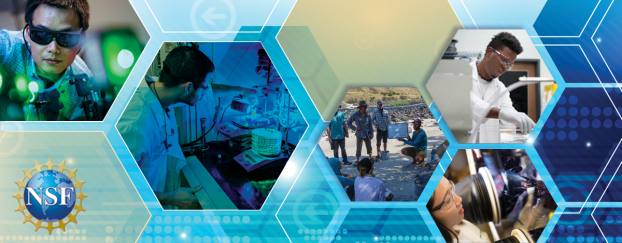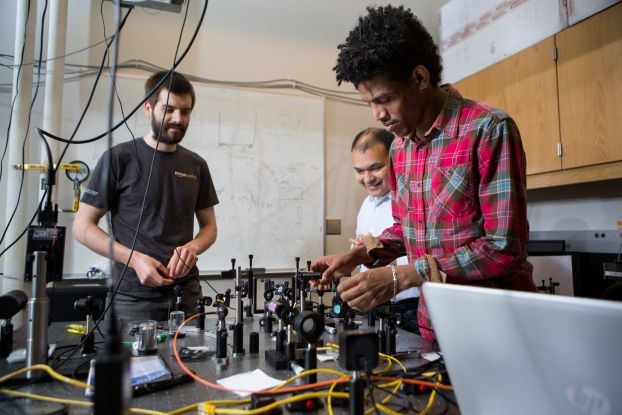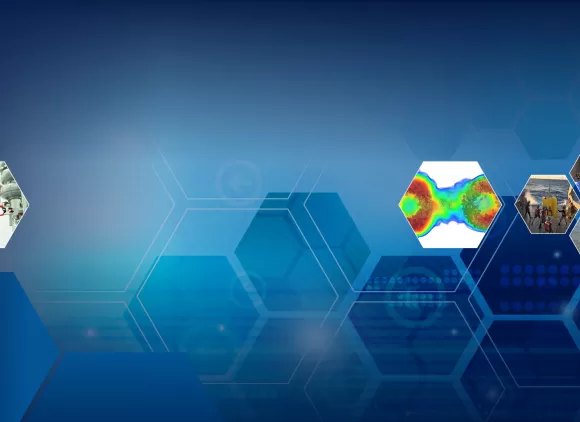News

Credit: National Science Foundation
NSF announces $120 million in funding to create 4 new Science and Technology Centers
The U. S. National Science Foundation has announced a $120 million investment over five-year to support four new Science and Technology Centers (STCs). Since program inception in 1987, the STC: Integrative Partnerships program has supported exceptionally innovative, complex research and education projects that have opened up new areas of science and engineering and developed breakthrough technologies.
"Scientific discovery is the engine that drives human progress and underlies all of the technologies that we benefit from today," said NSF Director Sethuraman Panchanathan. "NSF's Science and Technology Centers enable our most creative scientists and engineers to open new vistas of scientific inquiry and make the discoveries that will keep the U.S. in the forefront of scientific discovery. I am delighted to see the impressive originality in ideas and approaches in these new STCs and know they will have a tremendous impact."
The new centers will support advances in fields ranging from cell biology and complex materials to new applications of sound waves and environmental change. Each awardee will receive approximately $6 million per year over a five-year period, with the possibility of continual funding for up to five additional years.
Click on the Center to learn more about them:
-
Led by researchers from the University of Illinois Urbana-Champaign; Harvard Medical School; and the J. Craig Venter Institute.
-
The center aims to bring together expertise across cell and structural biology, chemistry, physics, engineering and computer science to develop whole-cell models that will transform our understanding of how cells function. Since cells are the fundamental units of all organisms, whole-cell models will provide important information about cellular functions in animals, plants, bacteria and fungi. Whole-cell models may also be used to compare the functions of healthy and diseased cells, leading to a better understanding of what goes wrong in diseased cells.
- Led by researchers from the University of Arizona; California Institute of Technology; The City University of New York; the Georgia Institute of Technology; University of Alaska Fairbanks; UCLA; University of Colorado Boulder; Wayne State University; and Spelman College.
- Recent advances have revealed that topological acoustics (TA) phenomena possess extraordinary properties, such as extreme resistance to disorder, such that TA waves can be transmitted in obstructed domains without generating echoes or reflections. Exploiting surprising links between acoustics and quantum mechanics, the NewFoS STC will tackle grand challenges using TA focused on three main areas: quantum information science; the future of wireless communication; and applying TA to bypass remote sensing limitations in the physical world at scale for issues such as climate change.
-
Led by a team of researchers from the University of Michigan; University of Illinois Urbana-Champaign; Northeastern University; University of Southern California; Wayne State University; Chicago State University; North Carolina State University; and Formative Evaluation Research Associates.
-
The "ink" used in advanced manufacturing is shapeable and yet consists of diverse, often non-spherical, particles. This "particle-based matter" is the focus of COMPASS, which will bring together a team of theoretical, experimental and computational researchers to develop the science and technology necessary to establish a much deeper understanding of particle-based matter as complex systems. By leveraging the relationship between complexity and functionality, the center aims to ignite a revolution in 3D printing and other forms of additive manufacturing with materials with customizable properties.
-
Led by a team of researchers from the University of Massachusetts Amherst; Northern Arizona University; University of Maine; University of California, Santa Cruz; University of Washington; Montana State University; Western Washington University; Huliauapaʻa; Alaska Pacific University; New York University; College of Menominee Nation; University of Michigan; Gedakina; and SUNY College of Environmental Science and Forestry. CBIKS also includes partnerships with 57 Indigenous communities.
-
The center aims to advance knowledge about environmental change and its effects on food and cultural systems at local and global scales by combining Indigenous knowledge with Western science in effective, ethical and novel ways. Eight regional research hubs include partners from multiple institutions across the social sciences, geosciences and environmental sciences, as well as Indigenous communities. CBIKS aims to advance not only what researchers know about interactions between the natural world and human societies, but also how to investigate and address related societal challenges.
About
The Science and Technology Centers program has grown from a new idea into a vital, interdisciplinary network. It has catalyzed breakthroughs, built bridges of exchange with industry, spun off new technologies and businesses, and trained young scientists and engineers.
The Science and Technology Centers (STC): Integrative Partnerships program supports exceptionally innovative, complex research and education projects that require large-scale, long-term awards. STCs focus on creating new scientific paradigms, establishing entirely new scientific disciplines and developing transformative technologies which have the potential for broad scientific or societal impact. STCs conduct world-class research through partnerships among institutions of higher education, national laboratories, industrial organizations, other public or private entities, and via international collaborations, as appropriate. They provide a means to undertake potentially groundbreaking investigations at the interfaces of disciplines and/or highly innovative approaches within disciplines. STCs may involve any area of science and engineering that NSF supports. STC investments support the NSF vision of creating and exploiting new concepts in science and engineering and providing global leadership in research and education.
NSF's Science and Technology Centers:
- Conduct world-class research through partnerships among academic institutions, national laboratories, industrial organizations and other entities, both domestically and internationally.
- Undertake significant investigations at the interfaces of disciplines and/or using fresh approaches within disciplines.
- Can involve any areas of science and engineering that NSF supports.
History
In 1989, the National Science Foundation (NSF) established the Science and Technology Research (STC) Centers Program to help maintain U.S. preeminence in science and technology and ensure the requisite pool of scientists with the quality and breadth of experience required to meet the changing needs of science and society-ingredients essential to successful economic competitiveness.
The original objectives of the program were to:
- Exploit opportunities in science and technology where the complexity of the research problems or the resources needed to solve these problems require the advantages of scale, duration , and/or equipment and facilities that can only be provided by a campus-based research center.
- Involve students and research scientists and engineers from academia, nonprofit organizations, industry, and Federal laboratories in order to enhance the training and employability of professionals with an awareness of potential applications of scientific discoveries and to provide a mechanism for increasing the transfer of knowledge among sectors of society.
- Provide stable, long-term funding.
Developing STEM Talent

Credit: Arka Majumdar, University of Washington
Centers provide a rich environment for encouraging future scientists, engineers, and educators to take risks in pursuing discoveries and new knowledge. STCs foster excellence in education by integrating education and research, and by creating bonds between learning and inquiry so that discovery and creativity fully support the learning process.
NSF expects STCs to both involve individuals who are members of groups that have been traditionally underrepresented in science and engineering at all levels within the Center (faculty, staff, students, and postdoctoral researchers) as well as be a leader in broadening participation in STEM. Individuals who may be underrepresented in STEM include those who identify as women, persons with disabilities, Blacks and African Americans, Hispanics and Latinos, American Indians, Alaska Natives, Native Hawaiians, and Other Pacific Islanders. The terms for these racial and ethnic populations are derived from the US government's guidance for federal statistics and administrative reporting (OMB Statistical Policy Directive No. 15, Race and Ethnic Standards for Federal Statistics and Administrative Reporting). Although these social identities are listed separately, they do not exist in isolation from each other and the intersection of one of more of these social identities may need to be considered when designing plans for diversity, equity, and inclusion within the STC Center. Centers may use either proven, or innovative mechanisms based on the relevant literature, to address issues such as recruitment, retention, success, and career progression of all individuals in the Center.
Active centers
Class of 2023
- Science and Technology Center for Quantitative Cell Biology (QCB)
- New Frontiers of Sound Science and Technology Center (NewFoS)
- Center for Complex Particle Systems (COMPASS)
- Center for Braiding Indigenous Knowledges and Science (CBIKS)
Class of 2021
- Center for Chemical Currencies of a Microbial Planet (C-CoMP)
- Science and Technologies for Phosphorus Sustainability Center (STEPS)
- Center for Learning the Earth with Artificial Intelligence and Physics (LEAP)
- Center for OLDest Ice EXploration (COLDEX)
- Center for Research On Programmable Plant Systems (CROPPS)
- Center for Integration of Modern Optoelectronic Materials on Demand (IMOD)
Class of 2016
- Center for Bright Beams (CBB)
- Center for Cellular Construction (CCC)
- Center for Engineering MechanoBiology (CEMB)
- Science and Technology Center on Real-Time Functional Imaging (STROBE)
Class of 2013
Graduated Centers
BEACON: An NSF Center for the Study of Evolution in Action
Award Abstract: 0939454
Center Director: Erik D. Goodman
Michigan State University (Lead Institution)
North Carolina A&T State University
University of Idaho
University of Texas at Austin
University of Washington
Center for Dark Energy Biosphere Investigations
Award Abstract: 0939564
Center Director: Jan Amend
University of Southern California (Lead Institution)
University of Alaska, Fairbanks
University of California, Santa Cruz
University of Hawaii
University of Rhode Island
Center for Energy Efficient Electronics Science
Award Abstract: 0939514
Center Director: Eli Yablonovitch
University of California Berkeley (Lead Institution)
Massachusetts Institute of Technology
Stanford University
The University of Texas at El Paso
Contra Costa College
Los Angeles Trade Technical College
Emergent Behaviors of Integrated Cellular Systems
Award Abstract: 0939511
Center Director: Roger D. Kamm
Massachusetts Institute of Technology (Lead Institution)
Clark Atlanta University
Georgia Institute of Technology
Morehouse College
University of California, San Diego
University of Illinois at Urbana-Champaign
University of Michigan
University of Minnesota
University of Pennsylvania
Spelman College
Texas A&M
Center for Science of Information
Award Abstract: 0939370
Center Director: Wojciech Szpankowski
Purdue University (Lead Institution)
Bryn Mawr College
Howard University
Massachusetts Institute of Technology
Princeton University
Stanford University
University of California, Berkeley
University of California, San Diego
University of Illinois at Urbana-Champaign
Center for Coastal Margin Observation & Prediction (CMOP)
Award Abstract: 0424602
Center Director: Antonio M. Baptista
Oregon Health and Science University (Lead Institution)
Oregon State University
Saturday Academy
University of Maryland Center for Environmental Science
University of Utah
University of Washington
University of Wisconsin, Madison
Center for Layered Polymeric Systems (CLiPS)
Award Abstract: 0423914
Center Director: Eric Baer
Case Western Reserve University (Lead Institution)
Cleveland Institute of Art
Cleveland Municipal School District Ohio Northern University
Fisk University
Naval Research Laboratory
Rochester Institute of Technology
Rose-Hulman Institute of Technology
State University of New York
University of Southern Mississippi
University of Texas at Austin
Center for Microbial Oceanography (C-MORE)
Award Abstract: 0424599
Center Director: David M. Karl
University of Hawaii (Lead Institution)
Massachusetts Institute of Technology
Monterey Bay Aquarium Research Institute
Monterey Peninsula College
Oregon State University
University of California-Santa Cruz
Woods Hole Oceanographic Institution
Center for Multi-Scale Modeling of Atmospheric Processes (CMMAP)
Award Abstract: 0425247
Center Director: David A. Randall
Colorado State University (Lead Institution)
Colorado College
Columbia University
Hampton University
Lawrence Livermore National Laboratory
National Center for Atmospheric Research
Pacific Northwest National Laboratories
The Catamount Institute
University of California, Los Angeles
University of California, San Diego
University of Colorado at Boulder
University of Maryland
University of Utah
University of Washington
Center for Remote Sensing of Ice Sheets (CReSIS)
Award Abstract: 0424589
Center Director: S. Prasad Gogineni
University of Kansas (Lead Institution)
Elizabeth City State University
Ohio State University
NASA
Pennsylvania State University
University of Maine
Team for Research in Ubiquitous Secure Technology (TRUST)
Award Abstract: 0424422
Center Director: S. Shankar Sastry
University of California at Berkeley (Lead Institution)
Carnegie Mellon University
Cornell University
Mills College
San Jose State University
Smith College
Stanford University
University of California, Berkeley
Vanderbilt University
Center of Advanced Materials for the Purification of Water with Systems (WATERCAMPWS)
Award Abstract: 0120978
Center Director: Mark Shannon
University of Illinois (Lead Institution)
Clark Atlanta University
Massachusetts Institute of Technology
National Risk Management Research Laboratory
Rose Hulman Institute
Rutgers University
Sandia National Laboratories
University of California at Berkeley
University of Notre Dame
Yale University
Center for Biophotonics Science and Technology (CBST)
Award Abstract: 0120999
Center Director: Dennis Matthews
University of California at Davis (Lead Institution)
Alabama A&M University
Fisk University
Lawrence Livermore National Laboratory
Mills College
Stanford University
University of California at Berkeley
University of California at San Francisco
University of Texas at San Antonio
National Center for Earth-Surface Dynamics (NCED)
Award Abstract: 0120914
Center Director: Efi Foufoula-Georgiou
University of Minnesota (Lead Institution)
Johns Hopkins University
Louisiana State University
Science Museum of Minnesota
Southern Illinois University Carbondale
St. Anthony Falls Laboratory
University of California at Berkeley
University of Colorado at Boulder
University of Illinois at Urbana-Champaign
University of Texas at Austin
Center for Embedded Networked Sensing (CENS)
Award Abstract: 0120778
Center Director: Deborah Estrin
University of California at Los Angeles (Lead Institution)
California Institute of Technology
University of California, Merced
University of California, Riverside
University of Southern California
Center for Integrated Space Weather Modeling (CISM)
Award Abstract: 0120950
Center Director: W. Jeffrey Hughes
Boston University (Lead Institution)
Alabama A&M University
Dartmouth College
Florida Institute of Technology, Melbourne
National Center for Atmospheric Research
Rice University
Science Applications International Corporation
Stanford University
University of California at Berkeley
University of Colorado at Boulder
University of Maryland
Center on Materials and Devices for Information Technology Research (CMDITR)
Award Abstract: 0120967
Center Director: Philip Reid
University of Washington (Lead Institution)
California Institute of Technology
Cornell University
Georgia Institute of Technology
New Mexico Highlands University
Norfolk State University
University of Arizona
University of Central Florida
University of Maryland, Baltimore County
Adaptive Optics
Award Abstract: 9876783
Center Director: Claire Max
University of California at Santa Cruz (Lead Institution)
California Institute of Technology
Indiana University
Lawrence Livermore National Laboratory
Michigan Technical University
Montana State University
University of California at Berkeley
University of California at Irvine
University of California at Los Angeles
University of Chicago
University of Houston
University of Rochester
Center for Behavioral Neuroscience (CBN)
Award Abstract: 9876754
Center Director: Elliott Albers
Georgia State University (Lead Institution)
Clark Atlanta University
Emory University
Georgia Institute of Technology
Morehouse College
Morehouse School of Medicine
Spelman College
Center for Environmentally Responsible Solvents and Processes (CERSP)
Award Abstract: 9876674
Center Director: Joseph DeSimone
University of North Carolina at Chapel Hill (Lead Institution)
Georgia Institute of Technology
North Carolina A&T State University
North Carolina State University
University of Texas at Austin
Nanobiotechnology Center (NBTC)
Award Abstract: 9876771
Center Director: Harold Craighead
Cornell University (Lead Institution)
Clark Atlanta University
Howard University
Oregon Health and Science University
Princeton University
Sciencenter
Wadsworth Center
Center for Sustainability of semi-Arid Hydrology and Riparian Areas (SAHRA)
Award Abstract: 9876800
Center Director: Juan Valdes
University of Arizona (Lead Institution)
Arizona State University
Desert Research Institute
New Mexico Institute of Mining and Technology
Northern Arizona University
Pennsylvania State University
University of California at Irvine
University of California at Los Angeles
University of California at Merced
University of California at Riverside
University of California at San Diego
University of Colorado
University of New Mexico
Utah State University
Center for Advanced Liquid Crystalline Optical Materials (ALCOM)
Award Abstract: 8920147
Center Director: John West
Kent State University (Lead Institution)
Center for Astrophysical Research in Antarctica (CARA)
Award Abstract: 8920223
Center Director: John Carlstrom
University of Chicago (Lead Institution)
Center for Biological Timing (CBT)
Award Abstract: 8920162
Center Director: Gene Block
University of Virginia
Center for Clouds, Chemistry and Climate (C4)
Award Abstract: 9405024
Center Director: Veerabhadran Ramanathan
University of California at San Diego (Lead Institution)
Center for Computer Graphics and Scientific Visualization
Award Abstract: 8920219
Center Director: Richard Riesenfeld
University of Utah (Lead Institution)
Center for Engineering Plants for Resistance Against Pathogens (CEPRAP)
Award Abstract: 8920216
Center Director: George Bruening
University of California at Davis (Lead Institution)
Center for High-Pressure Research (HIPR)
Award Abstract: 8920239
Center Director: Donald Weidner
State University of New York at Stony Brook (Lead Institution)
Center for Light Microscope Imaging and Biotechnology
Award Abstract: 8920118
Center Director: Alan Waggoner
Carnegie Mellon University (Lead Institution)
Institute for Research in Cognitive Science (IRCS)
Award Abstract: 8920230
Center Director: Aravind Joshi
University of Pennsylvania (Lead Institution)
Southern California Earthquake Center
Award Abstract: 8920136
Center Director: Thomas Henyey
University of Southern California (Lead Institution)
Center for Synthesis, Growth, and Analysis of Electronic Materials
Award Abstract: 8920120
Center Director: John White
University of Texas at Austin (Lead Institution)
Center for Ultrafast Optical Science
Award Abstract: 8920108
Center Director: Gerard Mourou
University of Michigan (Lead Institution)
Center for Advanced Cement-Based Materials
Award Abstract: 8808432
Center Director: Surendra Shah
Northwestern University (Lead Institution)
Center for Analysis and Prediction of Storms
Award Abstract: 9120009
Center Director: Kelvin Droegemeier
University of Oklahoma (Lead Institution)
Center for Discrete Mathematics and Theoretical Computer Science
Award Abstract: 9119999
Center Director: Diane Souvaine
Rutgers University at New Brunswick (Lead Institution)
Center for High-Performance Polymeric Adhesives and Composites
Award Abstract: 8809714
Center Director: James McGrath
Virginia Polytechnic Institute and State University (Lead Institution)
Center for Microbial Ecology
Award Abstract: 9120006
Center Director: James Tiedje
Michigan State University (Lead Institution)
Center for Molecular Biotechnology
Award Abstract: 9214821
Center Director: Leroy Hood
University of Washington (Lead Institution)
Center for Particle Astrophysics
Award Abstract: 9120005
Center Director: Marc Davis
University of California at Berkeley (Lead Institution)
Center for Photoinduced Charge Transfer
Award Abstract: 8810024
Center Director: David Whitten
University of Rochester (Lead Institution)
Quantized Electronic Structures
Award Abstract: 9120007
Center Director: Evelyn Hu
University of California at Santa Barbara (Lead Institution)
Center for Research on Parallel Computation
Award Abstract: 9120008
Center Director: Ken Kennedy
William Marsh Rice University (Lead Institution)
Center for Superconductivity
Award Abstract: 9120000
Center Director: Miles Klein
University of Illinois at Urbana-Champaign (Lead Institution)




